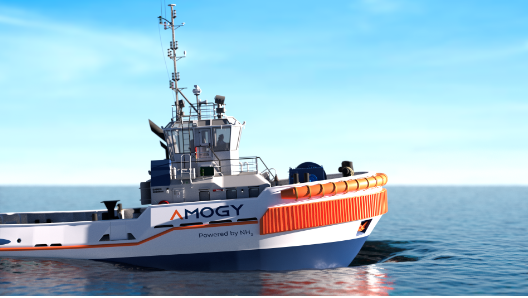Amogy Inc., Brooklyn, N.Y., recently announced plans to retrofit a 105'x27'x15' tug and deliver the ammonia-powered, zero-emission vessel in late 2023.
Getting the first ammonia-powered vessel on the water signals a huge milestone in the journey to zero-emissions shipping, as ammonia is predicted to become the leading fuel source for the world’s giant cargo ships by 2050, according to the International Energy Agency.
Amogy is currently retrofitting the tug at Feeney Shipyard, Kingston, N.Y. The tug was originally built in 1957 at Brooklyn-based Jakobson Shipyard and uses diesel generators and electric motors, with its ammonia-to-power system. The original tug was built for Virginia Railway Co.
It will be outfitted with a one-megawatt version of the unique system, three times larger than what has been field-tested on Amogy’s ammonia-fueled semi-truck earlier this year. Amogy’s highly efficient ammonia-to-power technology feeds liquid ammonia through its cracking modules integrated into a hybrid fuel cell system, which powers the electric motors for zero-carbon shipping, the company said.
Amogy intends to launch the tugboat later this year in upstate New York, pending further safety testing and regulatory discussions.
“We’re incredibly proud of unveiling the first ammonia-powered vessel later this year — especially because of the hope, promise and anticipation that ammonia has built as a zero-emission fuel in the heavy transportation industry — specifically in regards to maritime shipping,” said Seonghoon Woo, Amogy’s CEO, said in a statement. “This is the first milestone of many you will see from Amogy in accelerating the accessibility and scalability of clean energy in the global maritime industry. With successful demonstrations of our ammonia-powered drone, tractor and semi-truck under our belts, we look forward to presenting the first ammonia-powered ship in 2023, with a target to fully commercialize in 2024.”
Yara Clean Ammonia (YCA), one of the world’s largest ammonia producers and the largest trader and shipper of ammonia around the world, will be providing green ammonia for the demonstration.
Ammonia, which does not emit CO2 when used as a fuel, is expected to become a next-generation fuel as it contains properties ideally suited for the hydrogen economy. Furthermore, green ammonia, which is produced with renewable energy, results in zero greenhouse gas emissions from well to wake, according to Amogy.
“We are excited to be a part of Amogy’s tugboat project and to deliver green ammonia as a fuel for the world’s first vessel powered by ammonia,” Magnus Ankarstrand, president of YCA, said. “Yara Clean Ammonia plans to launch the world’s first ammonia bunker network in Scandinavia, which is expected to expand YCA’s capacity to produce and ship ammonia globally.”
Other partners that are collaborating to bring the first ammonia-powered ship to life include Seam, Amogy’s electrical systems integrator; C-Job Naval Architects, the independent ship design company integrating the ammonia system; and Feeney Shipyard, from whom Amogy sourced the tugboat, who will lead retrofitting construction, engine removal and more under supervision of C-Job Naval Architects. Additionally, Amogy is working with Unique Technical Solutions (UTS), its electrical and systems integrator from prior demonstrations, for the electrical and systems work involved in scaling up the powerpack for pre-commercial use.
International shipping accounted for about 3% of global energy-related carbon dioxide emissions — a percentage that’s expected to climb as more vessels deliver more goods and as other sectors reduce their share of global emissions, Amogy said. Amogy has developed a proprietary ammonia-to-power technology that converts ammonia to electric power effectively and efficiently.
Amogy is working with the Coast Guard and partnering with leading classification society DNV to ensure close alignment with all maritime safety standards, Amogy officials said.
“DNV has been working with Amogy since December 2021, focusing on the safety aspects of the development of their ammonia system,” said DNV’s senior consultant in maritime environmental technology, Hans-Christian Wintervoll. “A high-level feasibility study was executed in early 2022, and Amogy has shown great momentum in development from that point, through the HAZID workshop in June the same year, to the HAZOP workshop in January this year.”
To date, Amogy has raised $70 million in funding from strategic investors such as Amazon, Saudi Aramco, SK Innovation, AP Ventures and DCVC.




